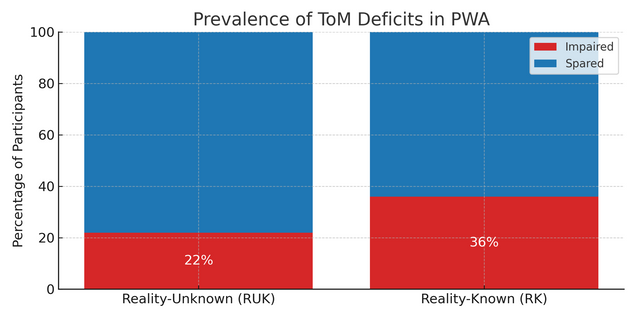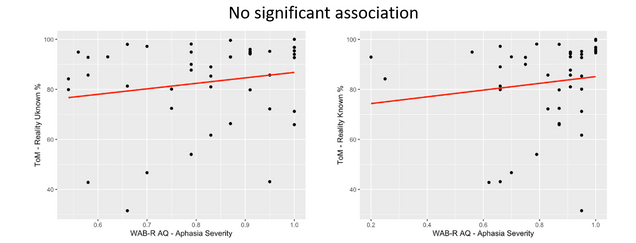Theory of Mind Deficits in People with Post-Stroke Aphasia
Acknowledgements
This work was conducted as part of a larger NIH-funded project titled “Functional reorganization of the language and domain-general multiple demand systems in aphasia” (NIDCD Grant 1R01DC016950, PIs: Swathi Kiran and Evelina Fedorenko). It reflects a collaborative effort from current and former researchers at the Boston University Center for Brain Recovery, including Maria Varkanitsa, Nicole Carvalho, Anne Billot, Isaac Falconer, Jadelyn Kurtz.
Theory of Mind
Theory of Mind— or the ability to recognize that others have their own thoughts, emotions, intentions, and beliefs— is often affected in neurological and psychiatric conditions. Yet, it’s rarely been studied in people with post-stroke aphasia. A few small studies have suggested that even individuals with significant language impairment can succeed on nonverbal Theory of Mind tasks.
Research Goals
This study set out to (1) assess how common Theory of Mind deficits are in people with aphasia (PWA), (2) examine the link between these deficits and severity of language impairment, and (3) explore whether these deficits reflect broader brain health.
Research Methods
We studied 44 individuals with chronic post-stroke aphasia (most over 5 years post-stroke and with mild symptoms). In addition to behavioral testing, 34 underwent MRI scans to measure lesion volume and markers of cerebral small vessel disease (CSVD)—a condition affecting the brain’s small blood vessels that contributes to stroke and dementia risk. Participants completed two nonverbal false-belief tasks, adapted from Biervoye et al., which measured their ability to infer others’ beliefs in both “reality-unknown” and “reality-known” conditions.
Based on their performance in these two scenarios, participants were either classified as “impaired” or “spared” in each task.
Key Findings
- Theory of Mind deficits are common:
- 22% of our participants were impaired on the reality-unknown task
- 36% of our participants were impaired on the reality-known task

- Deficits are not tied to aphasia severity:
- Using both logistic and linear regression models, we found no significant link between ToM task performance and language severity scores.

- ToM may signal broader brain health issues:
- Our exploratory analysis suggests that markers of cerebral small vessel disease may be associated with poorer ToM performance—raising the possibility that ToM deficits reflect underlying vascular burden.
This study shows that Theory of Mind difficulties in aphasia are not just a byproduct of impaired language. They may point to deeper disruptions in social cognition and brain health. These insights underscore the need for a holistic, multidimensional approach to aphasia rehabilitation— one that extends beyond language scores and lesion location to include social-cognitive abilities as well as neurovascular health. Even when language improves, persistent challenges in real-world interactions may stem from co-occurring conditions. And recognizing these factors is critical to designing interventions that are tailored to individual needs.